Can You Feed Ducklings Medicated Chick Starter
I've read a lot of duck posts that say medicated chick starter is toxic to ducklings. But the truth is, I safely fed lots of ducklings medicated chick starter before I heard it was a no-no.
After that, I stopped for a while but when my feed store ran out of the non-medicated stuff, I had no choice. So, at that point, I did some research to get to the bottom of what the risks were for feeding ducklings medicated chick starter.
Spoiler alert! I didn't find any. Instead, I found a lot of information on why it's most likely a non-issue.
Still, as a duck lover, I wanted to understand what was in medicated chick starter so that I could shake that icky feeling that I was doing something risky once and for all. Here's what I found.
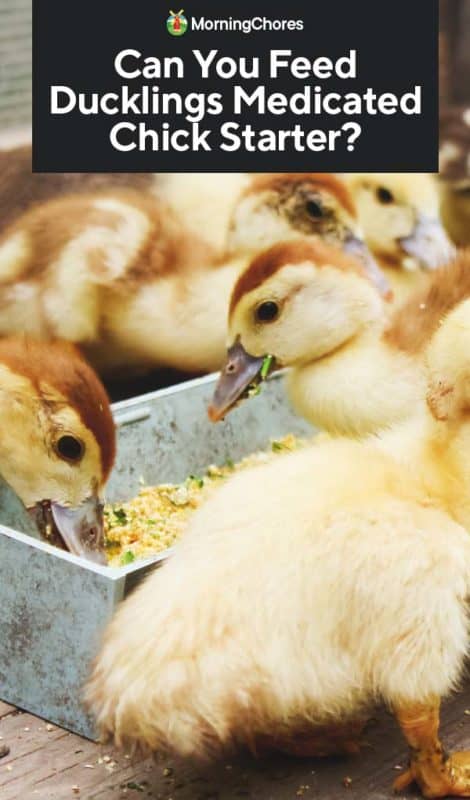
What is Medicated Chick Starter?
Medicated chick starter is designed specifically for chickens who have not been vaccinated for coccidiosis .
Coccidiosis Vaccine
The coccidiosis vaccine contains a small dose of weakened cocci designed to trigger a chick's immune response without putting them at risk of dying. Vaccines are a biological product regulated by the USDA. They are also allowed to be used in organic eggs and meat.
(Read our Coccidiosis in Chickens post for more information on this chicken disease.)
Medicated Chick Starter
Medicated chick starter works in a completely different way. It doesn't contain any cocci.
Instead it contains an FDA regulated drug that kills the cocci. Rather than building the chick's immune system, it prevents overload by killing the cocci until chicks are older and have a working immune system.
When using medicated chick starter you are also not supposed to change the bedding because the residues of dead or weakened cocci shed in fecal matter in the bedding also help to build a chick's immune system similar to vaccinating.
Note: Using medicated feed in poultry that received the coccidiosis vaccine is a waste of money because the medication in the feed will kill the cocci administered in the vaccine.
Now, with that background, let's get into what kind of medication is found in chick starters.
Amprolium
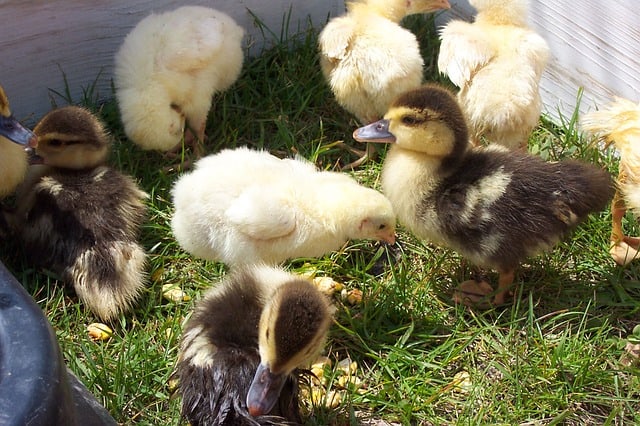
Most medicated chick starter available at retail outlets contain a cocci killing medication called amprolium. According to PoultryDVM, amprolium works by "mimicking thiamine (Vitamin B1), which is what cocci require to grow and reproduce inside the chicken. When cocci ingest amprolium, they experience thiamin deficiency and starve from malnutrition".
This drug isn't just used in chick starter feed. It also shows up in feed for other kinds of livestock like calves and turkeys. It's also used to treat mature animals such as mature laying hens or lactating cows.
It's even sometimes used "extra-label" for dogs, cats, and sometimes even ducks. Extra-label means prescribed by a veterinarian under FDA guidelines. This allows vets to recommend low-risk drugs approved for use in one animal to be prescribed for use in an animal it hasn't been specifically been approved for.
The FDA also maintains a list of drugs that can't be used extra-label. Amprolium is not on the prohibited list.
General Safety Risks
The health advisements for amprolium are that long-term use can lead to thiamin deficiency. Also, if you use too much, animals can have hemorrhagic diathesis (excessive bleeding) and die.
When administered in feed, though, the dose is low and limited by what an animal can eat. As such, amprolium is generally considered one of the safest coccidiosis preventatives available.
This is why it is commonly used in feed marketed at retail stores. Unlike many of the other coccidiosis treatments and preventatives, this one is considered safe enough for average consumers who may not even read the label to learn about appropriate use.
Research on Amprolium in Ducks
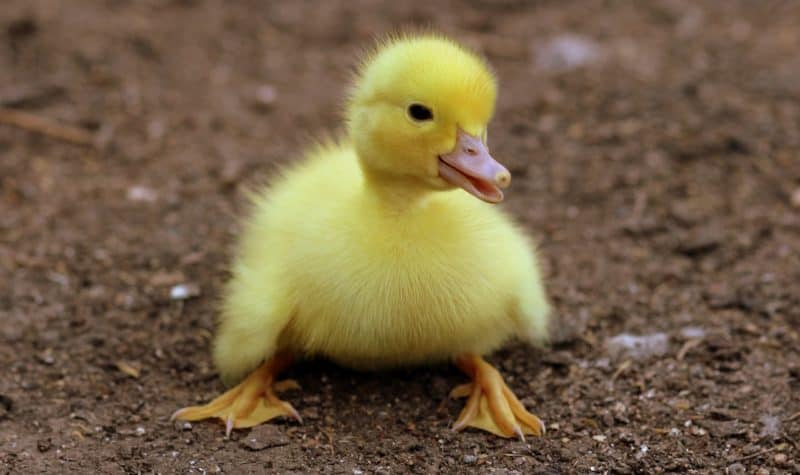
Ducks don't seem to be as susceptible to coccidiosis as other poultry even when raised in duck houses. So, there's not a lot of reason for pharmaceutical companies to test the risks of amprolium in ducks.
As such, I couldn't find any information about amprolium being unsafe for ducks. But I did find a few things that made me believe it is safe for ducks.
1. One Study
There was one scholarly study that specifically fed amprolium medicated feed to ducks for 4 weeks and found that medicated chick and turkey starters were better for feed to weight conversion ratios. Also, no ill health effects were identified.
2. Expert Advice
Also, there were several professional duck keepers who said they had spoken with veterinarians who said it was fine to use with ducks. Here are two examples of experts stating that amprolium is safe for ducks.
Metzer farms, which is the leading hatchery specializing in waterfowl in the U.S., wrote this post: Can medicated feed be used for waterfowl?
Shagbar Bantams, a hatchery that specializes in call ducks, also wrote a post that confirmed the safety of amprolium and bacitracin. The author says that this has been confirmed with two research veterinarians.
3. Proof of Use
I also found a few instances of amprolium being sold specifically for the use in ducks in other countries. Here's an example from Australia: Enfield Produce.
Additionally, I found one instance in the US from Purina that seemed to indicate amprolium could be used for a mixed meat bird flock that included ducks.
4. Purina Example
Purina offers an unmedicated duck feed that you can use from hatching to end of life. But they also offer a medicated and non-medicated Flock Raiser designed for use with chickens, ducks, and turkeys in a mixed flock.
The non-medicated flock raiser has no niacin information in the online marketing materials, although it is rated for use with ducks. It also doesn't say anything about being safe for ducklings.
The medicated flock raiser is primarily intended for broilers/meat birds. Its marketing materials promise "guaranteed niacin levels for ducklings". So, a reasonable person would consider that product appropriate for ducks, right?
Now, here's where it gets a little confusing because, in an unrelated blog post on the Purinamills website, the author writes: "Keep in mind ducklings and goslings should not be fed a medicated starter-grower feed. Medicated starter feeds include amprolium, a coccidiostat that is not approved for use with ducks or geese."
Not approved, though, doesn't mean toxic. While I can't speak for Purina, I really can't imagine a major feed company would make such a huge mistake in marketing an amprolium product for use with ducklings if there was a significant risk for toxicity.
5. No Toxicity Proof
After following hundreds of links, I couldn't find any examples of amprolium being toxic to ducks. But I found plenty of evidence of it being used by professional and backyard duck keepers without any toxic effects.
Bentonite Advisory
The one piece of information I read repeatedly is that amprolium shouldn't be used in feeds that contain bentonite. Notices say that the bentonite may cause the amprolium to be unstable.
I couldn't find any information on what that instability meant for poultry health. I suspect it probably just renders the product ineffective. But, if you use bentonite with your livestock, you may want to do further research.
Why the Rumor?
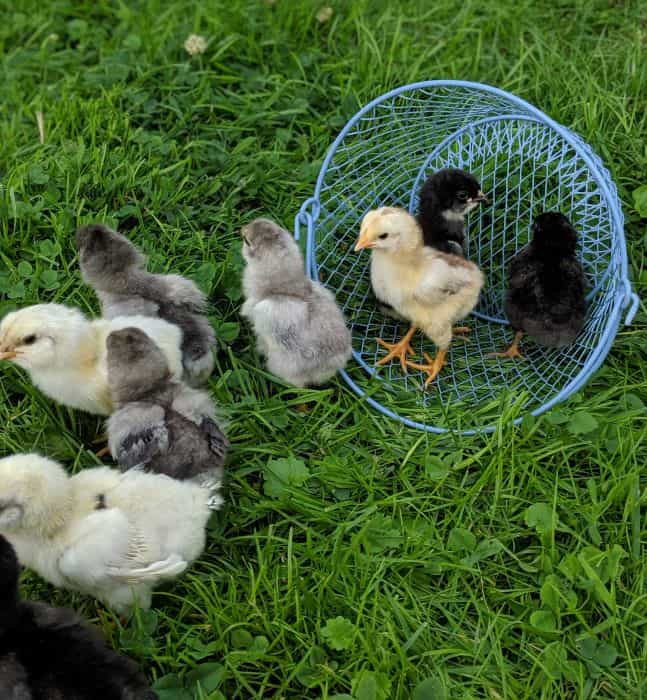
If amprolium is what's in medicated chick starter and it's not really an issue for ducks, why do so many people keep saying don't use medicated chick starter for ducks?
Amprolium is not the only medication used in chick starter. It's the only one I could find in every brand sold at all of my local feed stores or that came up in my internet search.
Yet, if you buy chick starter direct from a mill that makes feed for industrial meat birds, you may be able to find a feed that uses a different medication. So, let's look at those other coccidiosis preventatives used by industrial poultry producers.
Sulfa Drugs
I found several instances of duck keepers attributing the fear of medicated chick starter for ducks to "sulfa drugs". This class of drugs includes sulfonamides like sulfadimethoxine, sulfadiazine, sulfamethazine, sulfaquinoxaline, sulfathiazole, sulfamerazine, sulfasalazine, and sulfachloropyridazine.
Sulfadimethoxine is FDA approved to treat meat ducks for outbreaks of Escherichia coli, Riemerella anatipestifer, and Pasteurella multocida (fowl cholera). However, this product is prohibited for use in laying ducks and must be withdrawn from ducks 5 days before slaughter to prevent risks of residues in human food.
Sulfa drugs were extremely popular from the 1940s to about the 1990s. Plus, they are also still in use in industrially raised broiler chickens. However, they have fallen out of favor for two reasons.
First, there's concern about how much of their residue lingers in meat and eggs and negatively impacts humans. Additionally, because of their antibiotic properties, sulfa drugs are also much more highly regulated than something like amprolium. Fortunately, the FDA has made big crack downs on their use in animal feed.
Unless you live in an extremely rural area heavily populated with industrial chicken houses, you probably won't find Sulfa drugs in medicated chick starter sold at retail outlets.
Polyether ionophores
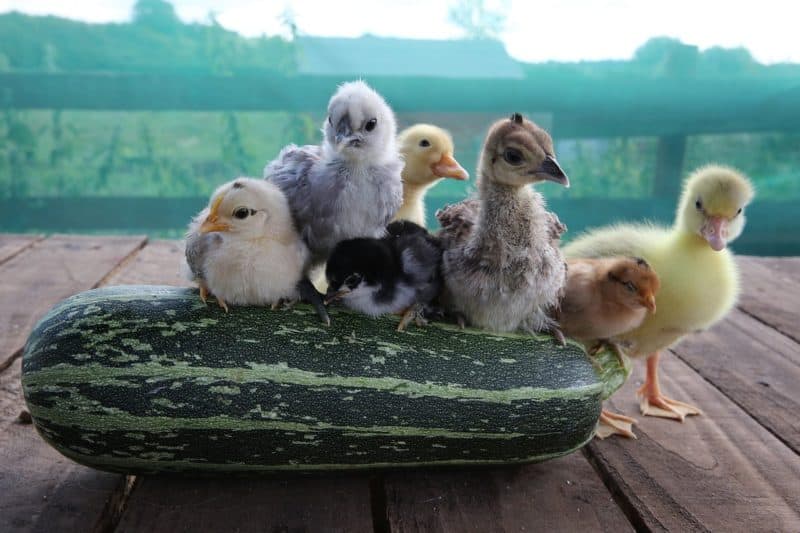
Though sulfa drugs may not be entirely safe for humans that eat lots of duck eggs or meat containing them, they are still probably safe for ducks to take in their feed. But, there is one class of drugs that scare the heck out of me.
Polyether ionophores, including Lasalocid, Monensin, Narasin, and Salinomycin, are potentially toxic to all poultry unless used in the exact prescribed manner. Let's take a look at these drugs and their risks.
Lasalocid
Lasalocid is a hot weather coccidiosis treatment that makes poultry thirsty. Its use requires careful salt intake management. It shows up in a product called Avatec used to treat coccidiosis in pheasants, partridges, quails, and guinea fowl.
Originally, the makers tried to include ducks and geese on the application for approved uses, but they were removed from the approval list "after assessment." That likely means that they couldn't prove safety or there was a risk of toxicity.
If this additive is in feed, the label is required by law to say: "FOR BROILER OR FRYER CHICKENS ONLY and/or FOR GROWING TURKEYS ONLY and/or FOR CHUKAR PARTRIDGES (UP TO EIGHT WEEKS OF AGE) ONLY and/or FOR RABBITS (UP TO SIX AND ONE-HALF WEEKS OF AGE) ONLY".
So, if you are considering using a medicated game bird feed for your ducks, you will probably want to double-check that the medication used is not Lasalocid.
Monensin
Monesin has an endless variety of trade names depending on which formulation is being marketed. But its primarily used for ruminants and sometimes in broiler chickens and turkeys.
It also comes with a risk for paralysis if taken by layers or in high doses by turkeys. In many countries, this is only allowed with a prescription from a veterinarian. Like sulfa drugs, it's not currently common in retail feed mixes.
Narasin
Narasin is toxic to turkeys. It can also be toxic to chickens when given in conjunction with sulfa drugs. Warnings on the interaction and specific uses for this product should be noted on the feed label.
Salinomycin
Salinomycin is commonly used in the broiler chicken industry. It's been known to cause paralysis when fed to laying hens.
This is also known to be very toxic to turkeys. These labels too should come with warnings on safe use and specific livestock applications.
Risk Factors for Ducks
Based on the known risks of polyether ionophores, I believe these could absolutely be toxic to ducks if not used in a manner prescribed by a veterinarian. If by some freak event, you found them in feed marketed for backyard poultry, I'd seriously consider steering clear of them unless recommended by your veterinarian.
Medicated Chick Starter for Ducklings
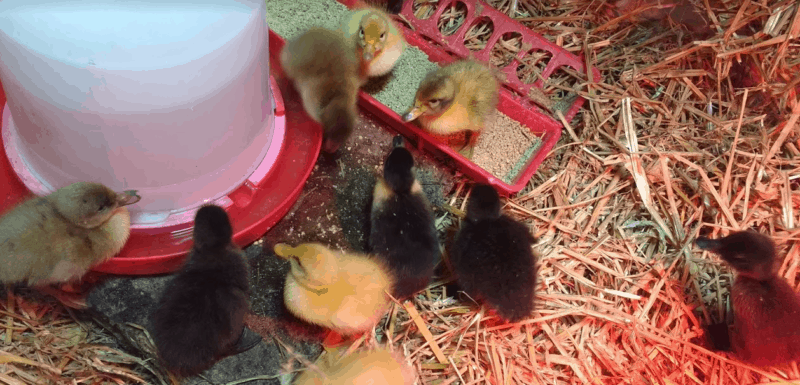
Now, with all that research in mind, let's get back to the original question. Can you use medicated chick starter for ducks?
I am not a veterinarian and can't tell you what to do. But here's where I stand on the issue.
Non-Medicated Feed is Ideal
Since ducks don't have the same risks for coccidiosis as chicks, medicated feed is unnecessary most of the time. Also, I prefer to use non-medicated feeds for all my animals. I raise my animals as naturally as I can while keeping them safe, so my risks for coccidiosis are pretty low in general.
Yet, when medicated chick starter is my only affordable option, I'll use it if the medication is amprolium and there are no other scary things on the label.
Always Read Labels!
Before I grab any feed bag, medicated or otherwise, I also read the labels carefully to look for any warning signs. For example, I saw one bag several years ago that said: "Only for use with broiler chickens."
I skipped it – not just for my ducks, but for my laying chicks too. I haven't seen that product for several years. But even with products I buy regularly, I always double-check the labels just in case they change the information or formulations.
Nutritional Content
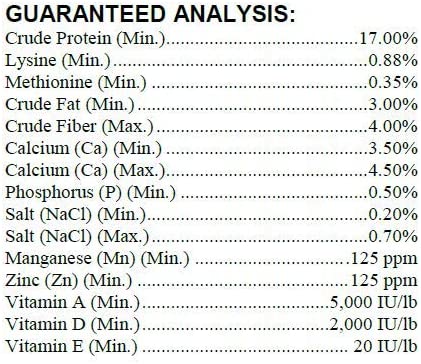
For me, I am more concerned about getting the right protein, niacin, and calcium content in duckling feed than I am about amprolium.
1. Protein
Protein is a complicated question with ducks and one that requires its own post. For me, though, since I use duck feed as a supplement to forage (even in day-old ducklings) and not as a complete feed, I want protein above 20%, and preferably more like 24% when I can find it.
For confined ducks though, not eating significant amounts of forage, protein around 20-22% for the first few weeks tend to be more ideal. After that 18% protein rations will help reduce the risk of angel wing developing in ducks who don't forage intensively.
2. Niacin
Ducks need feed that contains 55–70 mg of niacin per kilogram of feed. I either buy a brand of feed for my ducklings that contains sufficient niacin or I supplement it if the label doesn't state niacin content.
I've never had a duck suffer toxicity from medicated feed, but I have seen niacin deficiency in ducklings. I simply don't risk it anymore.
3. Calcium
I'll also take medicated chick starter over layer crumbles in a pinch. This is because layer crumble has a different ratio of calcium to phosphorous than grower feed formulas.
Research suggests that ducklings that get too much calcium relative to phosphorous don't grow well and can have bone problems. So, rather than trying to figure out how to get the right formulation of phosphorous to calcium, I stick with feeds designed for young poultry instead of laying poultry for ducklings.
Final Advice About Duckling Feed
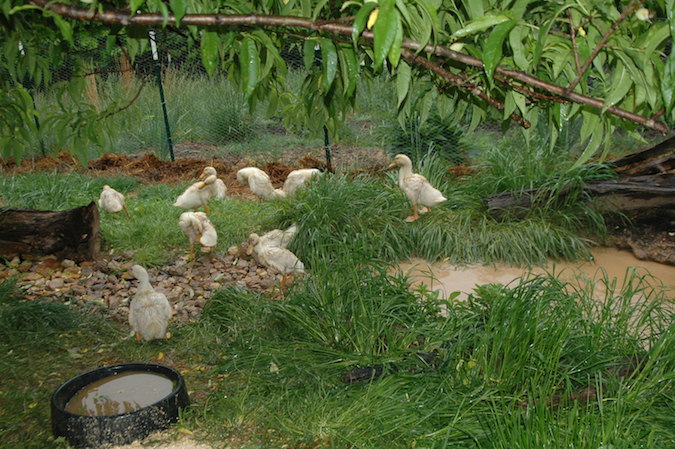
If you can find it and afford it, feed formulated for ducklings is the best way to go. Also, don't forget to always read those labels to know the risks and make sure you use the product as it is intended.
Now, the fact that you read this post in its entirety means you care about your ducks and are willing to put in the work to make informed choices. So, if you must choose an alternative duckling feed, just take a deep breath and trust your instincts.
In my experience, Good Research + Calm Use of Intuition = Peace of Mind in all things homestead.
Was this article helpful?
Yes No
Source: https://morningchores.com/medicated-chick-starter-for-ducklings/
Post a Comment for "Can You Feed Ducklings Medicated Chick Starter"